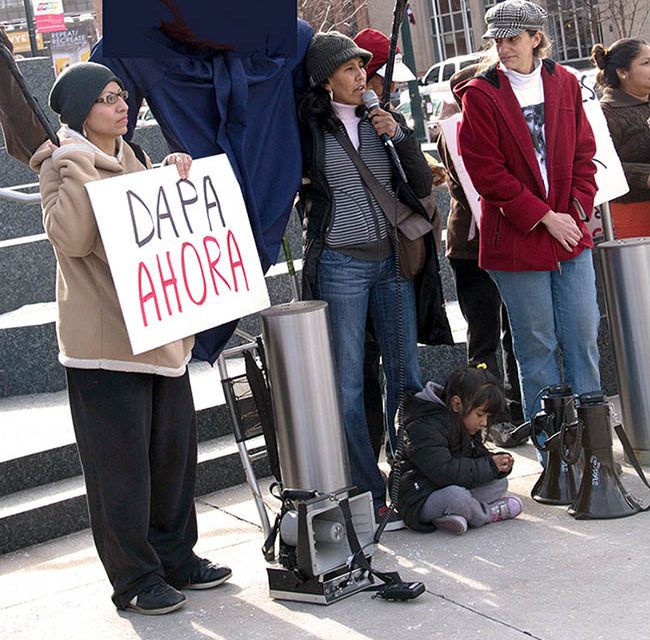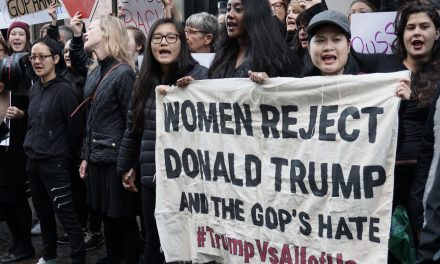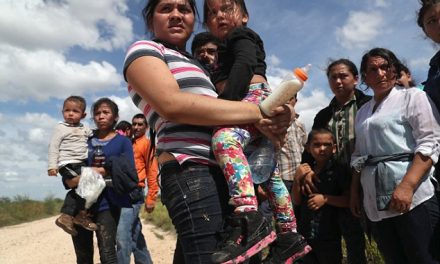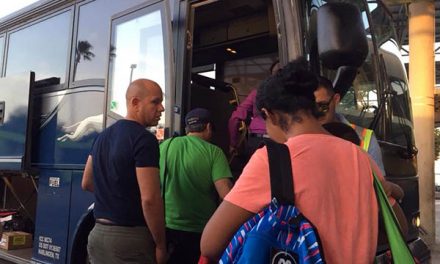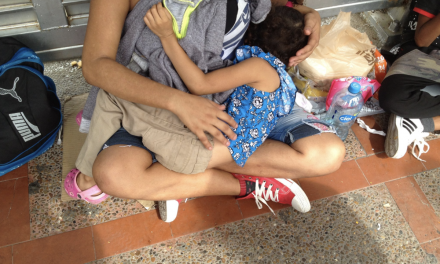In a devastating blow to millions of children and their families, the US Supreme Court announced a decision on June 23, 2016 that effectively freezes DAPA (Deferred Action for Parents of Americans), and ties it up in court. This program would provide a legal path for undocumented immigrant parents of US citizen children to remain with their families, but without approval leaves millions at risk for deportation. But despite their pain and grief, many immigrant activists in Colorado are determined to use this as an opportunity to grow stronger as a community, as a movement.

Ezzie Dominguez (left), Jeanette Vizguerra (center) and Jennifer Piper of AFSC (right), and Zury (Vizguerra’s 5-year-old daughter, sitting) at a DAPA rally in January 2016.
“I do not see any justice in this decision,” declared Ezzie Dominguez, the DAPA coordinator for CIRC (Coloradans for Immigrant Rights). “We trusted that the Supreme Court, the maximum authority in our country, would make the right decision today. But this decision puts 5 million families at risk of separation and now we have to explain to our children why we must continue living with the fear our families could be separated.”
“Each day thousands of children including in my family…wake up in fear, not knowing what’s going to happen tomorrow, if their father is going to come back from work, if their mother is going to pick them up from school,” explained Jeanette Vizguerra, a community organizer and activist who has been fighting against her own deportation for seven years. Vizguerra and millions of others had high hopes that an affirmative decision on DAPA would help alleviate the fears of these kids and their families.
But a 4-4 deadlock on United States v. Texas sends the case focusing on President Obama’s executive order on immigration back to the lower courts, because the US Supreme Court could not reach a decision. The order would establish DAPA and also expand DACA (Deferred Action for Childhood Arrivals). The tie vote was made more likely with the death of Chief Justice Anton Scalia so this means that the ruling by the 5th Circuit Court of Appeals in New Orleans still stands. Many activists are outraged because it was basically a decision by default, issued with a one-sentence statement from the Supreme Court and no opinion.
“[This decision] hurts us as women and also for our families,” said Dominguez in an interview with ESCRIBANA. “For so many, America is our home, we are all children of this homeland but feel…that America is not loving us all equally, and instead is hurting us. This is the pain, we feel that we are…hated and not treated as equal. Some are more equal than others.”
“I feel sad and angry, deceived by the judges and the system,” Vizguerra told ESCRIBANA. “But this also gives us more strength as a community, for me to keep fighting for my children, for my family and so many other families that are affected by this decision. Vizguerra’s three young US citizen children were among several featured in a recent campaign called, “This is My American Story” by First Focus, about the devastating impact of the current immigration crisis on children.
Leticia Lopez, a leader of Lamar Unidos who would have been eligible for DAPA had it been implemented, has two children, one a US citizen and the other who qualified for DACA. “I’ve lived and worked and paid taxes in Colorado for many years. DAPA would allow me to continue to contribute positively to the Colorado economy and society. Without DAPA we will continue to live in fear of deportation and separation from our families. This is our worst nightmare.”
“I can tell you this from my own experience of what my son said once he heard the news (of the Supreme Court decision),” said Dominguez. He felt such fear, of not knowing, asking, ‘Now what’s going to happen to my dad?’ Children shouldn’t have to be faced with knowing what deportation means, what this decision means. I don’t want my children to be affected by that hatred, the negativity.” Dominguez continued, “I want to make sure that I keep him still believing in the system and know that there is justice, that there is a (legal) process and…his voice is valid.”
The U.S. Supreme Court decision blocks the USCIS (US Customs & Immigration Service) from implementing President Obama’s executive order to create DAPA and an expanded DACA, which would have allowed accepted applicants to receive a work permit along with a social security card and be deferred from deportation, according to CIRC – the Colorado Immigrant Rights Coalition. United States v. Texas was one of several lawsuits filed by states in response to Obama’s order on immigration.
“We will continued to fight to be united,” declared Dominguez, “because instead of dividing us they have united us even more because it makes us stronger and then we become one, we become powerful and our voice has power. Our vote has power. I know I am an American citizen and I will vote and use my power.” …And I will make sure that every other person who has the power to vote is utilizing it and is registered to vote and voting.” Dominguez pledged to work to get people to register and vote.
Several immigrant rights groups in Denver including CIRC and CIRC members, AFSC (American Friends Service Committee) and others are organizing vigils around Denver and the entire state to give immigrants directly affected by the decision a chance speak out about their frustration and disappointment. They are also collaborating with other groups around the country to design strategies to continue the fight, including raising awareness of the urgency for immigration reform that would help avoid separation of families with the massive number of deportations underway in recent years and today.
Vizguerra applauded these efforts, urging the groups to “go out into the communities that are affected…we need to work with the base, to be in touch with people who are directly affected.
For more information about actions go to: AFSC-Colorado for Immigrant Rights.

